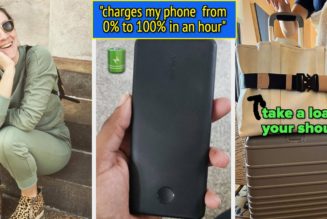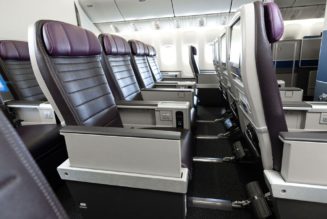
Hong Kong-based travel superapp Klook is harnessing influencer marketing and generative AI to tap into the wanderlust of social media-savvy adults and Southeast Asia’s rising middle class.
As younger, chronically online generations embrace traveling for leisure and consumers in Southeast Asia become wealthier, the decade-old online travel agency Klook–cofounded by Eric Gnock Fah, an honoree of the 2017 Forbes Asia 30 under 30 list–secured $210 million in a recent Series E+ funding round.
With an average user age of 27 to 35, Klook has become the “go-to travel brand” for millennials and Gen Z across Asia, says Ethan Lin, cofounder and CEO of Klook, in an interview from the company’s headquarters in Hong Kong. “We are their first touch point when they’re going out,” he says.
To fuel its expansion, Klook announced in December it raised $210 million in a Series E+ round led by Bessemer Venture Partners, with participation from billionaire Jean Salata’s EQT Private Capital Asia and Atinum Investment, a backer of billionaire Seo Jung-jin’s Celltrion. Also participating were prominent Southeast Asian firms, including Krungsri Finnovate, the fintech arm of Thailand’s Bank of Ayudhya; SMIC SG Holdings, controlled by the billionaire Sy siblings in the Phillipines; Shanghai-based Golden Vision Capital, founded by Jackson Wijaya of the Indonesian billionaire family behind Sinar Mars; and Kasikornbank Financial Conglomerate, controlled by Thai billionaire Banthoon Lamsam and his family.
“People need a place to go and find out what to do in life, and that’s what our brand recall is.”
The Series E+ round, which included bank facilities from Citi, JPMorgan and HSBC, brought Klook’s total funding raised to over $900 million. Klook declined to disclose its latest valuation and whether it plans to IPO, but claims its revenue tripled compared to 2019, and it became profitable for the first time in 2023. Previously, in 2018, Klook became one of Hong Kong’s rare startup unicorns, on the back of a $200 million funding round that valued Klook at over $1 billion.
“Asia is one of the largest experience travel markets globally,” Bryan Wu, partner at Bessemer Venture Partners, wrote in an email statement. “Once online booking penetration continues to rise, Klook as the category leader is best positioned to grow and become a strong next-generation travel platform.”
The Series E+ capital will go towards product innovation, social and digital marketing, and integrating generative AI across its website and app. Klook says it will use Google Cloud’s AI capabilities to automate translations for 10 languages, enhance its customer service chatbot K.Ai, and generate written content, such as short-form descriptions for activities.
Klook, short for “keep looking,” allows its users to book activities, tours and transportation. Cofounded in 2014 by Fah, Lin and CTO Bernie Xiaokang Xiong, Klook currently offers over 530,000 activities, or experiences–a fivefold increase from 2019, when it offered over 100,000–in 2,700 destinations globally.
“People need a place to go and find out what to do in life, and that’s what our brand recall is,” says Lin. “Just like how people remember Airbnb for alternative accommodation, for us, it’s when people think about what to do when they leave their homes.”
To the CEO, one of Klook’s competitive advantages is its wide range of activities, from massages to bungee jumping, and “exclusive benefits” that stem from partnerships. For example, last year, Klook partnered with the Professional Association of Diving Instructors (PADI) to sell diving equipment and certification courses, and the travel platform was the sole ticketer of billionaire Taylor Swift’s performance in Singapore, as part of her Eras tour.
Another advantage is Klook’s appeal to social media-savvy younger generations, its core demographic. Over 80% of millennials and Gen Zs base their travel bookings on recommendations from content creators, with the most trusted recommendations from “non-celebrity figures,” according to research published in January by Klook. The company aims to expand its network of 13,000 nano and micro-influencers, or content creators on Instagram with a minimum of 1,000 followers. Dubbed Kreators, or ‘creators’ with a ‘K’, these influencers can receive commissions or sponsored trips in exchange for user-generated content.
Two tourists wearing kimonos take selfies at the Eikando Zenrin-ji Temple in Kyoto, Japan.
Stanislav Kogiku/SOPA Images/LightRocket via Getty Images
With key markets in Hong Kong, Singapore, South Korea and Taiwan, Klook also aims to tap into more markets across Southeast Asia, where a burgeoning middle class has deeper pockets for new experiences. Online travel–spanning flights, hotels and vacation rentals–is one of five leading pillars of Southeast Asia’s digital economy, according to a December report jointly prepared by Google, Temasek and Bain. Travel and transport are on track to exceed pre-pandemic heights in 2024, with further headroom for growth among Klook and other online travel agencies (OTAs), the report added.
As more consumers book their travels online, customer loyalty is becoming an important issue for OTAs, according to Prudence Lai, senior analyst at Euromonitor International. Inspiring loyalty requires tailoring products to each intended audience–from the “Gen Z solo traveler” to the “millennial luxury traveler”–and providing greater levels of personalization.
“Considering the evolving fragmentation of traveler demand, hyper-personalization along the customer journey becomes a very important differentiator,” says Lai. “This also helps with loyalty in general for client retention.”
Klook faces off against other travel sites vying for the millennial and Gen Z market, such as U.S. brands like Agoda, Booking.com and Expedia. In Asia, these competitors include Shanghai-based Trip.com and Seoul-based Yanolja, billionaire Lee Su-jin’s travel superapp. Smaller startups have also entered the fray, including Seoul-based travel superapp MyRealTrip, an honoree of last year’s Forbes Asia 100 to Watch list, which raised a $56 million Series F funding round in January.
Still, to Lin, Asia’s future growth holds promise–just last year, the region was still in “year zero” out of the Covid-19 pandemic, as countries gradually lifted social distancing and travel restrictions.
“People are looking for more things to do, and I think Covid has accelerated that,” he adds. “Now, people just want to experience life.”









